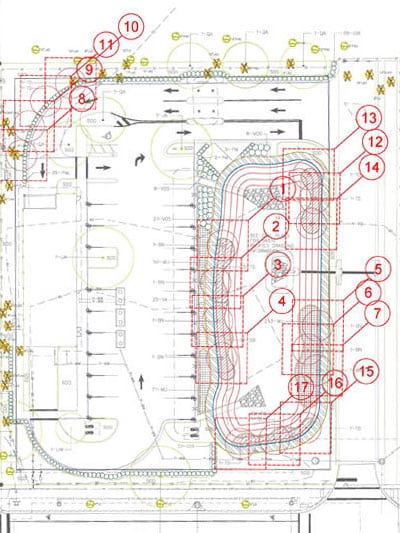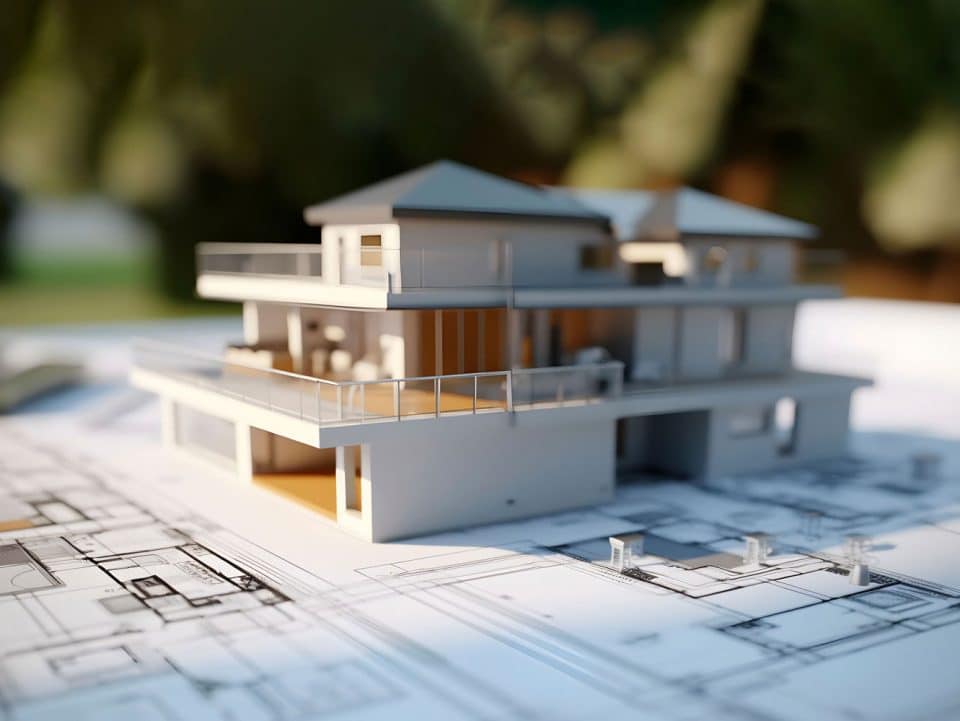
Using AI to Review Construction Plans
City and county building officials are increasingly under pressure to expedite their reviews of development projects. But checking whether a proposed development or structure complies with numerous land development and building codes is a laborious process that may take short-staffed city and county building departments many weeks or even months to complete.
What if, instead of manually reviewing drawings, a building official could access plans on a cloud-based portal, press a few keys and automatically determine whether the project meets all applicable codes — and even view an itemized list of the ones that don’t? Such a process could save inspectors, architects, engineers, developers and builders countless hours and reduce costs across the construction industry.
This is the idea behind a software system developed by AutoReview.AI, a Gainesville startup founded by researchers in the University of Florida’s College of Design, Construction and Planning. AutoReview.AI’s research team created its building and land development code checking system in partnership with the university and the city of Gainesville. The company represents the marriage of rigorous academic research and private industry expertise — and now it’s moving to transfer the technology to the market. Since it launched early this year, AutoReview.AI has signed up customers across Florida, including licensed building professionals; several cities and counties; and Carter + Clark, a major provider of services to builders and government clients.
But the company’s early success has been a long time in the making. The patent-pending technology underpinning AutoReview.AI’s products is based on more than a decade of research into the use of artificial intelligence (AI), natural language processing, virtual reality and AI-related algorithms to optimize the efficiency and cost-effectiveness of land development and building permit procedures.
Background: Code challenge

Most local building departments long ago moved away from shuffling paper copies of development and building plans to adopt online systems for permit applications. However, the shift to digital hasn’t notably decreased processing times. One of the biggest stumbling blocks is the time-consuming process of having building officials review plans to determine if they meet all applicable building and land development codes.
Efforts to tackle this problem with automated tools to check code compliance go back before architects and engineers widely adopted computer-aided design (CAD) software, and long before the more recent rise of building information modeling (BIM) to create 3-D models. One of the first commercial systems was introduced in 2000 by building authorities in Singapore, which integrated BIM capabilities to electronically audit building plans. However, this and another system developed in Finland had limited functionalities, including predominately checking whether plans met fire egress and accessibility codes.
AutoReview.AI’s automated permitting framework is thought to be the first such system introduced in the United States to use AI to automate the checking of whether a site or building plan meets all land development and building codes. Among other things, the software system was developed based on the entire Florida Building Code, which contains more than 800 pages and governs virtually every aspect of a building, from the height of handrails to the thickness of concrete.
While most provisions of the building code are specific and seem straightforward, some sections of the code contain language that is flexible and vague, which can lead to interpretation by plan reviewers and builders. This makes solving the problem with software difficult, and it’s one of the biggest challenges addressed by AutoReview.AI’s software system, which uses the growing power of AI and natural language processing.
Automated Site/Building Plan Review Types
Planning and Zoning
Landscape
Municipality Code
Municipality Ordinances
Land Development Code
AI Cloud Based Technology
Virtual Inspections
Civil Engineering
Infrastructure
Transportation
Building Codes
AutoReview.AI introduced a suite of products to automate the process of checking whether plans meet an array of city and county codes — from planning and zoning to land development. Additional products in the works include tools for virtual inspection of construction projects. Source: AutoReview.AI
Land development plans

In addition to the codes governing the construction of buildings, software engineers expanded the breadth of its system to automate the checking of plans against land development codes. Land development codes are comprehensive rules used by cities and counties to manage their planning, zoning, landscape, utilities, transportation and engineering requirements. Unlike the more rigid rules-based building codes, these comprehensive land development codes are by intention far more vague to allow local authorities more leeway to interpret codes to fit their environment.
In Florida, state law puts a time limit on how long cities and counties can review land development plans. Municipalities must approve or deny an application within 120 to 180 days, depending on various factors.
AutoReview.AI’s suite of products allows users to instantly review site plans against an array of municipal codes, including zoning and landscape regulations. Key to this system is its ability to handle both objective and subjective data. This encompasses the use of semantic natural language processing to extract information from construction documents, leveraging machine learning and text analysis. The software can review plans submitted in a wide variety of formats, including CAD and BIM files like DWG and Revit, and PDFs.
The technology to automate or semiautomate code compliance verification is a step beyond the digital permitting process currently used by counties and city building departments. Accurately reviewing building and site plans for compliance with countless codes can seem humanly impossible to do in an efficient manner. By streamlining the review process, the system not only saves time and lowers costs it’s more precise, according to building officials who have begun to use the software.
Survey of Building Professionals
Score another for serendipity. In August 2019, Nawari Nawari and his team sent a research survey to Florida real estate and construction professionals, as well as city and county building officials. Lo and behold, one of the surveys landed in the email box of Rob Christy, a Tampa entrepreneur and veteran of the construction permit servicing industry. As it happens, Christy was exploring how to use automation to improve his business. It wasn’t long before Christy and Nawari met and by early 2021 they founded what they later named AutoReview.AI and planned the market launch of its software framework.
And the survey? It helped to determine bottlenecks in the permitting process. Respondents identified four primary factors contributing to delays in the issuance of building permits: the high volume of applications; lack of staff to review the plans in a timely manner; increasing scale and intricacy of plans; and the many corrections required. The results also revealed that the most frequently violated sections of the building code were: means of egress, fire resistance, glazing and roof ventilation. In using natural language processing and machine learning, the company’s team developed software to interpret such ambiguous sections of the code.
The survey also identified ways that delays in the issuance of permits can disrupt a project and increase costs. To cite one example, the city of Orlando reported it takes on average more than two and a half months to review and decide whether to approve an application. Unnecessary and costly project delays may also have negative implications on a city’s community goals, such as encouraging economic development and promoting affordable housing.
Hitting the market
As part of its software development process, AutoReview.AI developers worked closely with Gainesville building officials, who provided access to real-world project plans submitted by building professionals. This was an important part of the multiyear R&D effort and helped perfect AutoReview.AI’s first products, which hit the market in February. Several builders, licensed building professionals, and governmental agencies have become customers of the subscription-based service. In addition to the city of Gainesville, which uses the software to review some plans, public customers include Pasco County and Altamonte Springs.
Pasco County rolled out the software to check plans against its zoning and landscaping rules, and the county is exploring extending its use to other areas of permit review. “Using technology like this will significantly improve our ability to ensure that the development approval process is transparent, and our codes are absolutely enforced,” said Jack Mariano, chairman of the Pasco County Commission. “The turnaround time improved and backlog shortened in just the early-stage period that Pasco used AutoReview.AI. As comfort grows with its use and the capabilities of the product expand, efficiencies will grow.”
In October, Altamonte Springs officials announced it was the first city to launch “automated AI-powered site plan review in Florida.” City Manager Frank Martz told a TV news reporter, “it might take a staff employee a few weeks to get through one plan, while AI can do it in as little as 30 minutes. It’s just like a calculator. It’s going to give time back to our staff.”
AutoReview.AI next plans to roll out a virtual reality system that will allow inspectors to visit a construction site and overlay a building plan to verify whether a project complies with building codes. “The invention is a virtual building inspection software,” Lenny Terry, assistant director and licensing officer at UF Innovate said of the technology. “They upload the full design of a building into the cloud and then they’ll take either an iPad or a cell phone and go out to the actual building site and it would allow a building inspector to superimpose the actual plan on the actual structure and determine whether it’s up to code or not.”
The future of automated code compliance review has just begun.

Invention of the Year
The technology behind AutoReview.AI was recognized as one of the top innovations stemming from the University of Florida in 2022.
Nawari Nawari, professor in UF’s School of Architecture, and Ravi Srinivasan, director of graduate programs and research in the M.E. Rinker, Sr. School of Construction Management, accepted the Invention of the Year award from UF Innovate | Tech Licensing. The honor was for their development of “Virtual Building Construction Inspection for Permitting,” which UF licensing teams said stood out for its great potential. UF Innovate works to commercialize innovations from the University of Florida.
“Advances in technology and AI in the built and natural environment continue to evolve,” said Seth Watts, director of advancement in the UF College of Design, Construction and Planning. “The ability for companies like AutoReview.AI to be an industry leader in advancing our industry and profession is exciting for the future.”

Nawari Nawari, Ph.D., is a professor in the University of Florida’s School of Architecture; a professional engineer; and co-founder and chief technology officer of AutoReview.AI.

Rob Christy is owner of Suncoast Permits LLC, and CEO and co-founder of AutoReview.AI.